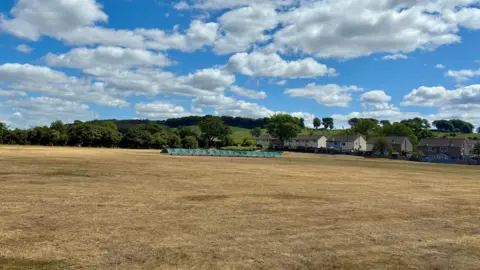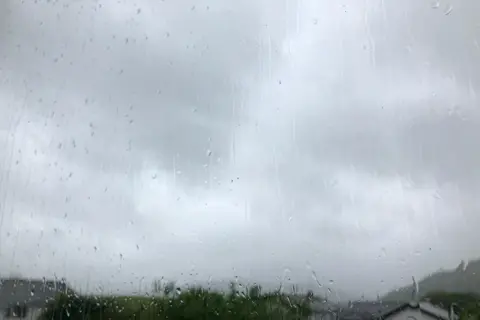Why are parts of the North more at risk of drought?
 Lindipops/BBC Weather Watchers
Lindipops/BBC Weather WatchersParts of the UK have seen the driest start to a year in close to a century.
The Department for Food, Environment and Rural Affairs (Defra) said north-east and north-west England had not experienced as dry a period between January and April since 1929.
Other parts of the UK have also faced particularly dry springs, but the North also saw below average rainfall in winter, according to Lucy Barker at the UK Centre for Ecology & Hydrology (UKCEH).
"This has resulted in exceptionally low river flows and reservoir levels," she said.
Meanwhile, nationwide it is believed this spring could be one of the driest on record.
Due to the drop in water supply, the Environment Agency officially declared a drought across the North West on 21 May.
This means United Utilities, the water firm which supplies millions in the region, will have to forecast potential timescales for introducing hosepipe bans.
The firm previously told the BBC it was bringing extra water into the system.
 Mrs M/ BBC Weather Watchers
Mrs M/ BBC Weather WatchersDr Gemma Coxon at the University of Bristol said the North West was particularly susceptible to water supply issues during periods of low rainfall.
This is because it has fewer groundwater aquifers than other parts of the country such as the South East, she said.
Aquifers act like "big sponges" which sit under the soil and soak up rainfall then slowly release it, she explained.
With fewer of these, river levels in the North West can drop more quickly during dry spells.
Recent rain has boosted river flows and soil moisture in the region, Ms Barker confirmed, but this had still not made up for the "long term dry period".
 Figaro/ BBC Weather Watchers
Figaro/ BBC Weather WatchersNo such drought has been declared in the North East.
Prof Hayley Fowler at Newcastle University said the "robust" water supply provided by Kielder Reservoir in Northumberland meant it would take much longer for the region's water supply to be affected by dry weather.
Dr Coxon said climate models predicted drier summers and wetter winters on average in the UK, but how the weather may look in future springs and autumns was much more "mixed".
"We're currently in a dry spring but next year it could be much wetter," she said.
Meanwhile, despite a wealth of weather data, the effect of human activity can also be difficult to ascertain or predict.
"It is challenging to disentangle exactly how much drier this spring has been due to climate change," Dr Coxon said.
'Water gauge stolen'
Rain data has been collected in the UK for centuries, with the longest continuous records going all the way back to 1767 in Oxford.
The Met Office has rainfall figures for the entire country going back to 1836, with recent efforts being made to transcribe historical handwritten statistics.
As part of that project, scientists listed some very specific additional comments left behind by data collectors of the day.
This included one person in Middleton-in-Teesdale who wrote in November 1876: "No readings as gauge stolen."
Another individual in Sunderland wrote in 1869: "Rev Iliff had his right arm broken in June so was prevented from taking his observations regularly and a few weeks afterwards a road was made through his garden and his instrument meddled with."
